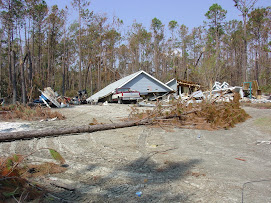The Sun Herald has consistently reported he would make Hurricane Katrina recovery the major part of his speech and they were true to their words. Perhaps Congressman Taylor now has a true champion for the multi peril concept in the Senate. Without further analysis here is the insurance exerpt of Senator Wicker's maiden Senate speech:
Much has been done, but there is much left to do.
Chairman Donald Powell, the Federal Coordinator for the Office of Gulf Coast rebuilding, acknowledged these challenges last week when he announced he was stepping down. He said it would be "some time before the area recovered."
I say this to my colleagues in the United States Senate: Katrina is not over. There are tall hurdles still to overcome. There is more the United States Congress must do.
The most urgent issue facing the Mississippi Gulf Coast is insurance. If you can't insure it, you can't build it or finance it. The rising cost of insurance cripples the efforts of small businesses, increases the cost of home-ownership, and drives rental rates beyond affordability.This is not just an issue for Mississippi. From Bar Harbor, Maine to Brownsville, Texas, millions of Americans live near the coastline, in the path of a future hurricane. For many years, insurance companies have refused to offer insurance protection for water damage caused by hurricanes; this led to the creation of the National Flood Insurance Program. After Katrina, the most important question for a homeowner or a small businessman was "wind or water?"
Wind versus water. That is the debate which still occurs today in courtrooms on the Mississippi Gulf Coast between insurance companies and storm victims.
This debate is what necessitated the multi-billion dollar supplemental appropriations package this body approved after Katrina, and unless Congress changes the law, the wind versus water debate will result in a multi-billion dollar supplemental appropriations package after the next big hurricane - wherever it may land.
Even worse, since Katrina, it is also common practice for insurance companies to not offer wind insurance at a rate that is even close to affordable. This is driving more and more homeowners and business owners into a state-sponsored wind pool, which acts as an insurer of last resort. But this is not a reasonable long-term solution, because too much risk is being placed in a too small of a pool.
The best solution available is to allow homeowners to purchase wind and flood insurance coverage in the same policy.
This will not only help the storm victims so they can know their hurricane damage will be covered; it also will protect the United States taxpayer. The American people are the most generous in the world, and their elected representatives will continue to respond to natural disasters, whether it is a hurricane on the East Coast or an earthquake in California, with supplemental disaster appropriations packages. But the size of these packages will be smaller if more people have insurance.
As a member of the House, I voted for Congressman Gene Taylor's multi-peril insurance legislation when it passed last September. I am committed to achieving the same success here in the Senate.

2 comments:
I agree it is desirable to have a policy that removes the water/wind question. My question is who will provide this policy? The next question is who will determine the rate levels? Clearly this has to be a government funded program. What happens if it is under funded? I have stated many times the private sector would offer this if adequate rate levels were allowed.
It's a good thing I'm still on email alert Ms Supsalemgr otherwise I would have missed your comment. This is a discussion I'd love to have online as it is both interesting and complex. Please join us on slabbed to get a better answer as your question is excellent but here is the short version.
The devil is in the details as your question implies. HR 3121 calls for actuarially sound rates thus I suspect the Government would use an actuary to set them. If it is underfunded the US Treasury would loan the money to pay. HR 3121 requires the program to recoup such loans from preiums.
You bring up a good point, one that I have bookmarked to a past comment left on Sam Friedman's blog that will be part of a future post on this topic, namely why not let the private sector enter this market and charge rates deemed actuarially sound by insurers?
I'm not as certain as you that private insurers want any part of the flood market. In fact, the history of that program indicates that is a big reason why it was created. At present the major retail insurers are fleeing the coastal wind market even outside the flood zone. It's pretty clear that under the present setup it's a safe assumption that trend will continue.
Finally about wordpress - they require an email addy to post but you do not have to sign up there. The first comment goes into "moderation" as the system default - we can't change that option. Thereafter you are free to post real time - it is IP based so posting from different systems could cause multiple comments to go into moderation - I know you sometimes travel so posting from a hotel room for example would cause a comment to go back into moderation. If you are concerned about privacy use a dummy yahoo address and get anonymizer. However as Nowdy indicated the email addy as well as the all site information is kept confidential. I would hope the fact I have posted my email contact information, and provided a handle that makes it very easy to ascertain my identity encourages some reciprocal level of openness on part of our readership but I do understand some people desire to remain anonymous thus my suggestion for masking software. I hope to see you on slabbed.
sop
Post a Comment